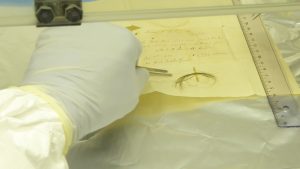
Genetic Stories Told by Beethoven’s Hair
Scientists have sequenced the genome of Ludwig van Beethoven, the world-famous German classical music composer, and pianist, revealing clues to the composer’s health and family history.
Beethoven’s musical skills were already apparent in his childhood; he gave his first public concert at seven. However, the musical genius began to have hearing problems at the beginning of the 1800s. His condition got worse over the years, and he eventually became functionally deaf in about twenty years. He also suffered from a number of other health problems in the last 10 years of his life, including rheumatism, jaundice, oedema and respiratory difficulties. He was 56 years old when a severe liver disease contributed to his death in 1827.
When his health first began to deteriorate, Beethoven asked his doctor to investigate his illness after his death and to make this record public. His autopsy revealed significant liver damage and a considerable dilation of the auditory nerve along with other related nerves. Even though the actual nature of his health problems and the cause of his death remained a subject of debate for years, scientists never forgot his wish.
Led by the University of Cambridge, an international team of researchers set their hearts on fulfilling this wish with the help of genetics. They obtained eight hair samples, all claimed to have belonged to the great composer and analysed their DNA. Two of these locks turned out to originate from other people. Among these, was the famous “Hiller lock,” once believed to have been cut from Beethoven’s head the day after his death, by the musician Ferdinand Hiller. Previous analyses on this lock suggested that Beethoven may have had lead poisoning, which may have played a role in his health problems, including his hearing loss. However, the genetic study found out that the “Hiller lock” did not even have a Y chromosome, it was from a woman -thus rendering all those suggestions false.

The remaining five locks, all dating from the last seven years of Beethoven’s life, were proven to have originated from the same individual. The composer’s whole genome was sequenced from one of these samples that belonged to Kevin Brown, a member of the American Beethoven Society. DNA extracted from this very well-preserved sample showed a strong connection to people living in present-day North Rhine-Westphalia, which matched with Beethoven’s known ancestry. They also examined DNA samples from Beethoven’s modern relatives, which surprisingly pointed to an extramarital affair in his paternal line, sometime within the past seven generations until his conception.
Although the researchers could not find a single genetic cause for Beethoven’s hearing loss or his chronic gastrointestinal problems, they discovered a number of significant genetic risk factors for his liver disease –including evidence of Hepatitis B infection.
As for his gastrointestinal complaints, the analyses did not reveal a solid genetic explanation, but his genomic data showed that coeliac disease, lactose intolerance, and irritable bowel syndrome (IBS) were highly unlikely to be the cause.
“We cannot say definitely what killed Beethoven, but we can now at least confirm the presence of significant heritable risk and an infection with Hepatitis B virus,” said Johannes Krause, from the Max Planck Institute of Evolutionary Anthropology. “We can also eliminate several other less plausible genetic causes.”
REFERENCES
- 1. https://www.uni-bonn.de/en/news/beethoven2019s-genome-offers-clues-to-composer2019s-health-and-family-history-1
- 2. https://beethovenscholar.com/index.php/2023/03/22/hiller-lock-authentication-project/
